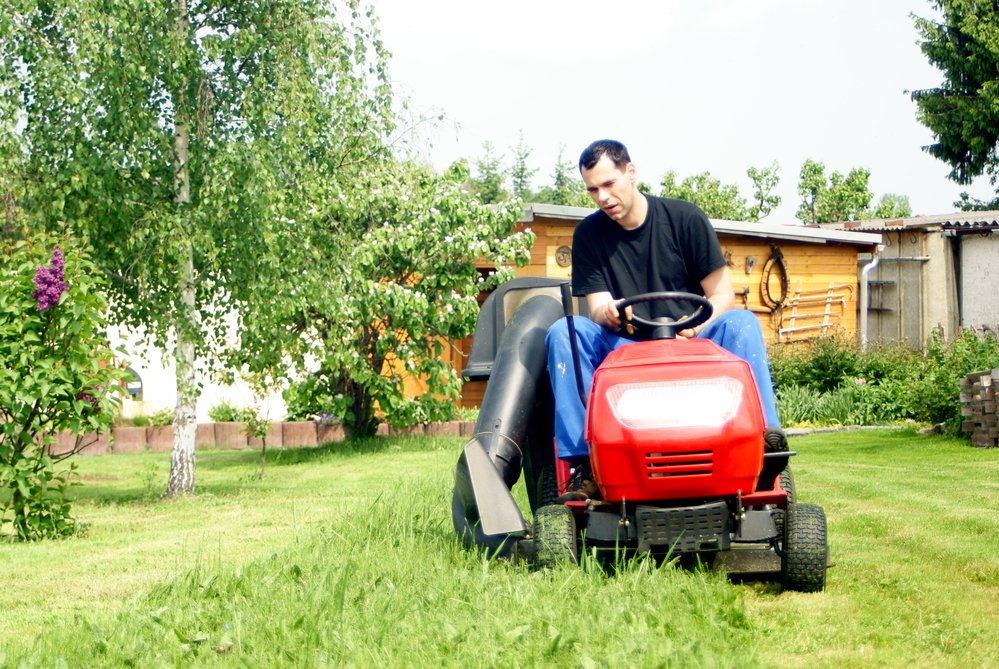Garden tractors are powerful machines that can help you maintain your lawn and garden with ease. However, like any other piece of machinery, they require regular maintenance to ensure longevity and reliable performance. Neglecting maintenance can lead to costly repairs and even premature replacement of the tractor.
One of the most critical aspects of maintaining a garden tractor is routine oil changes. Regular oil changes help to keep the engine lubricated and prevent wear and tear on the moving parts. It is essential to follow the manufacturer’s recommendations for oil type and frequency of changes. Additionally, it is crucial to check the oil level regularly and top it off as needed. Another critical fluid to monitor is the hydraulic fluid, which powers the tractor’s various functions, such as the steering and lift mechanisms.
In this article, we will discuss some essential tips for maintaining your garden tractor to extend its lifespan.
Understanding the Importance of Tractor Maintenance
Maintaining a garden tractor is crucial to ensure its longevity and durability. Neglecting regular maintenance can result in costly repairs or even the need for a replacement tractor. Regular maintenance can extend the lifespan of your tractor and protect your investment.
When it comes to tractors, maintenance is not just about changing the oil and filters. It involves a range of tasks, including routine monitoring of fluid levels and filters, examining belts and hoses, and maintaining correct tire care. Regular maintenance can also help prevent breakdowns and ensure that your tractor is functioning at its best.
In addition to saving money, regular maintenance can also help protect your investment. Tractors can be expensive; for instance, John Deere garden tractors, proper maintenance can help ensure that your investment lasts for years to come. By taking care of your tractor, you can protect your investment and ensure that it remains in good condition.
Routine Maintenance Tasks
To keep a garden tractor running smoothly and extend its lifespan, regular routine maintenance is essential. Here are some routine maintenance tasks that should be performed on a regular basis:
Clean the Mower Deck
One of the most important routine maintenance tasks for a garden tractor is to keep the mower deck clean. Over time, grass clippings, dirt, and debris can accumulate on the deck, which can cause belts and pulleys to wear out faster. To clean the deck, remove the belt guards and blow off any debris with an air compressor or leaf blower. Use a scraper to remove any buildup under the pulleys.
Change the Oil
Changing the oil is another important routine maintenance task for a garden tractor. Over time, the oil can become contaminated with dirt and debris, which can cause the engine to wear out faster. Check the owner’s manual for recommended oil change intervals and use the recommended type of oil. Be sure to dispose of the old oil properly.
Replace Filters
Air and oil filters should be replaced regularly to ensure that the engine is receiving clean air and oil. Check the owner’s manual for recommended replacement intervals and use the recommended type of filters. A dirty air filter can cause the engine to run poorly, while a clogged oil filter can cause damage to the engine.
Check Fluid Levels
It’s important to regularly check the fluid levels in a garden tractor, including the oil, coolant, and hydraulic fluid. Low fluid levels can cause damage to the engine or other components. Check the owner’s manual for recommended fluid levels and top off as needed.
Lubricate Moving Parts
Lubricating moving parts is another important routine maintenance task for a garden tractor. Over time, parts can become dry and start to wear out faster. Check the owner’s manual for recommended lubrication intervals and use the recommended type of lubricant. Be sure to lubricate all moving parts, including the steering mechanism, mower deck, and transmission.
Replace Spark Plugs
Spark plugs should be replaced regularly to ensure that the engine is running at peak performance. Check the owner’s manual for recommended replacement intervals and use the recommended type of spark plugs. A worn spark plug can cause the engine to misfire or run poorly.
Performing these routine maintenance tasks on a regular basis can help extend the lifespan of a garden tractor and keep it running smoothly. Be sure to follow the owner’s manual for recommended maintenance intervals and procedures.

Engine Care
The engine is the heart of the garden tractor, and proper engine care is essential for longevity. Here are some tips to keep the engine running smoothly:
Regular Oil Changes
Regular oil changes are one of the most important things you can do to keep your garden tractor’s engine running smoothly. The engine oil lubricates the moving parts in the engine and helps to keep it cool. Over time, the oil can become dirty and lose its ability to lubricate the engine properly. This can cause the engine to overheat and wear out more quickly.
It is recommended to change the engine oil and oil filter every 50 hours of operation or at least once a year, whichever comes first. However, it is always best to follow the manufacturer’s recommendations for your specific garden tractor model.
Check the Oil Level
Checking the oil level regularly is just as important as changing the oil. Low oil levels can cause the engine to overheat and wear out more quickly. To check the oil level, make sure the tractor is on a level surface, remove the dipstick, wipe it clean, reinsert it, and then remove it again. The oil level should be between the “full” and “add” marks on the dipstick.
Prevent Overheating
Overheating can cause serious damage to the engine. To prevent overheating, make sure the engine is properly cooled. Check the coolant level regularly and add more if necessary. Also, make sure the radiator and cooling fins are clean and free of debris.
Use the Right Type of Oil
Using the right type of oil is essential for proper engine care. Check the owner’s manual for the recommended type and viscosity of oil for your garden tractor’s engine. Using the wrong type of oil can cause damage to the engine and void the warranty.
Understanding the Role of Hydraulic Fluids
Hydraulic fluids play a crucial role in maintaining the performance and longevity of a garden tractor. These fluids are responsible for powering the hydraulic systems that control various components of the tractor, such as the steering, lift, and transmission.
It is important to note that hydraulic fluids are not the same as transmission fluids, although they may look similar. Transmission fluids are designed to lubricate and cool the transmission system, while hydraulic fluids are designed to transmit power and pressure throughout the hydraulic system.
To ensure optimal performance and longevity of the garden tractor, it is important to use the correct type of hydraulic fluid recommended by the manufacturer. Using the wrong type of fluid can result in damage to the hydraulic system and ultimately shorten the lifespan of the tractor.
In addition to regular maintenance, it is important to properly store hydraulic fluids. Exposure to extreme temperatures or moisture can cause the fluid to break down and lose its effectiveness. Storing hydraulic fluids in a cool, dry place away from direct sunlight can help maintain their quality and effectiveness.
Fuel System Maintenance
To ensure optimal performance and longevity of a garden tractor, it is important to maintain its fuel system. The fuel system includes the fuel tank, fuel line, fuel filter, carburetor, and fuel pump. Neglecting fuel system maintenance can lead to decreased fuel efficiency, engine damage, and costly repairs.
Fuel Filter Maintenance
The fuel filter is responsible for removing impurities from the fuel before it enters the engine. Over time, the filter can become clogged with debris, reducing fuel flow and engine performance. It is recommended to replace the fuel filter every 100 operating hours or at least once a year.
To replace the fuel filter, locate it on the fuel line between the fuel tank and carburetor. Use pliers to remove the clamps securing the filter to the fuel line. Then, remove the old filter and replace it with a new one. Secure the new filter with clamps and ensure there are no leaks.
Fuel Line Maintenance
The fuel line connects the fuel tank to the carburetor and can become cracked or damaged over time. Inspect the fuel line regularly for signs of wear and replace it if necessary. A damaged fuel line can cause fuel leaks, engine damage, and even fire hazards.
To replace the fuel line, first, disconnect it from the fuel tank and carburetor. Then, remove any clamps securing the line to the tractor. Install the new fuel line, securing it with clamps, and ensure there are no leaks.
Fuel Efficiency Maintenance
Maintaining fuel efficiency is crucial for reducing fuel costs and prolonging the life of the engine. To improve fuel efficiency, follow these tips:
- Use fresh fuel and avoid using fuel that has been sitting for more than 30 days
- Keep the air filter clean to ensure proper air flow to the engine
- Avoid overloading the tractor, which can cause the engine to work harder and burn more fuel
- Regularly check tire pressure to ensure proper traction and reduce fuel consumption
By following these fuel system maintenance tips, garden tractor owners can prolong the life of their tractors and ensure optimal performance.
Conclusion
In conclusion, regular servicing and maintenance are crucial for maintaining the longevity and safety of a garden tractor. It is recommended to have the tractor serviced by a dealer or professional mechanic at least once a year and to perform routine maintenance on the tractor after each use. By following these guidelines, garden tractor owners can ensure that their equipment runs smoothly and efficiently for years to come.

